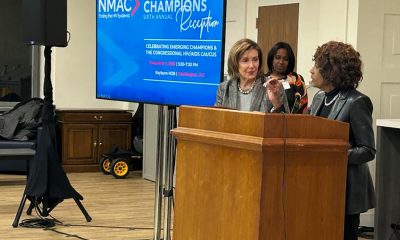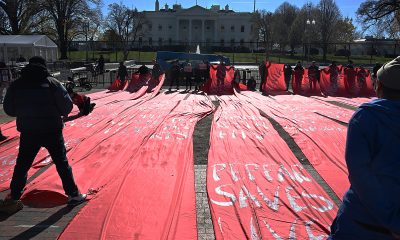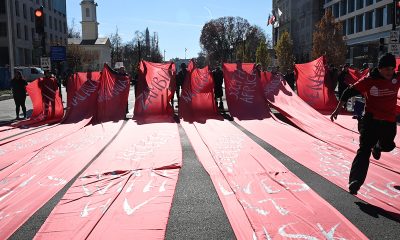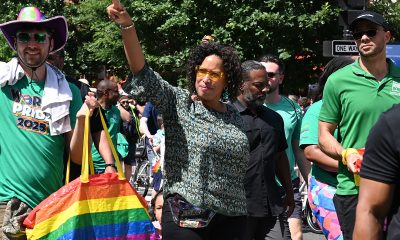Local
‘Outrage’ as killer gets 12 years
Court records unsealed; gay victim shot 5 times at point-blank range
The United States Attorney’s office this week reversed an earlier decision to seal court records showing the outcome of its case against two young men charged with first-degree murder while armed for the January 2010 shooting death of gay Maryland resident Gordon Rivers in Southeast Washington.
At the request of the U.S. Attorney’s office, a D.C. Superior Court judge on Wednesday unsealed records showing that District resident William X. Wren, 18, had been sentenced on Jan. 26 to 12 years in prison after pleading guilty to shooting Rivers five times at point-blank range inside Rivers’ car during a botched robbery.
Wren, who was 17 at the time of the murder, was charged as an adult.
The unsealed records show that Wren agreed to plead guilty last October in exchange for a government offer to lower the charge against him from first-degree felony murder while armed to second-degree murder while armed. Wren also agreed to plead guilty to charges of conspiracy to kidnap Rivers while armed with co-defendant Anthony Hager, 23, and conspiracy to rob Rivers while armed with a firearm. Hager was 22 at the time of the murder.
Judge Herbert Dixon also sentenced Wren to seven years on the two conspiracy charges but agreed to a request by Wren’s defense lawyer to allow the two sentences to run concurrently, limiting the total time served to 12 years.
The U.S. Attorney’s office moved to have the court records unsealed following inquires by the Washington Blade, which discovered through unsealed court records that the government dropped its case against Hager, who was also charged with first-degree murder while armed in the River’s killing.
“The U.S. Attorney’s Office determined that there was probable cause to arrest Anthony Hager in the murder of Mr. Rivers,” said William Miller, a spokesperson for the office. “However, the office later concluded that there was not sufficient evidence to meet the higher legal standard that is required to obtain and sustain a conviction.”
Miller noted that at the government’s request, the court dismissed the case “without prejudice,” which allows prosecutors to reinstate charges against Hager in the future if more evidence surfaces.
“The murder case remains under investigation,” he said.
Miller declined to disclose why prosecutors chose to seal the court records in the case against Wren, saying issues surrounding the sealing of cases are considered confidential. However, knowledgeable sources familiar with criminal cases before the D.C. Superior Court said cases are often sealed when defendants agree to cooperate with the government in the prosecution of another person charged with a crime. Such cooperation could potentially place a defendant at risk for retaliation, according to the sources, and sealing a case can sometimes protect the safety of the cooperating defendant.
Victims’ rights groups have sometimes complained that the sealing of cases also prevents the public from learning whether violent criminals are being prosecuted and sentenced appropriately.
Chris Farris, former co-chair of the D.C. group Gays and Lesbians Opposing Violence, said he was “outraged” that Wren could receive just 12 years for committing a murder and that Hager could get off “completely free” in the Rivers’ murder.
“Take away the gay angle, take away the history of hate crimes against our community, take away everything else, and I just find it incredibly stunning that one person in the case of a murder of someone who was fired on at point blank range five times gets 12 years in jail,” Farris said.
Court documents filed by the government and the defense in the case show that Hager allegedly conspired with Wren to force Rivers at gunpoint to drive the two to Rivers’ house in Maryland, where they planned to rob him of his valuables and steal his two vehicles. But the documents show that that Wren shot Rivers before Hager had a chance to enter the car.
Court records also show that authorities revoked Hager’s parole from an unrelated conviction for armed robbery in 2005 after learning of his arrest in the Rivers case. Miller said the parole revocation resulted in Hager being ordered to serve two more years for the earlier conviction.
Under the D.C. criminal code, Wren faced a possible maximum sentence of 70 years in prison for second-degree murder while armed with a firearm. First-degree murder while armed carries a maximum sentence of 90 years in prison under D.C. law.
Separate sentencing memorandums submitted by the defense and the U.S. Attorney’s Office asked Judge Dixon to consider mitigating factors that would justify a sentence significantly lower than the maximum sentence provided by law. Among other things, the two pointed to Wren’s cooperation with the government in the prosecution of Hager before the U.S. Attorney’s office decided to drop its case against Hager.
Defense attorney Spencer Hecht also states in his sentencing memorandum that Wren recounted that Rivers paid him for sexual encounters at Rivers’ house in Brandywine, Md., during a one-year period prior to the murder. Hecht’s sentencing memo says the sexual encounters began when Wren was 16.
“While the defendant unequivocally accepts responsibility for his extremely serious and dangerous conduct, and is extremely remorseful for taking the life of another, he offers the nature of his relationship with the decedent in mitigation,” Hecht says in his sentencing memo.
“The decedent was someone who preyed on the defendant’s youth, immaturity, and impressionability for a substantial period of time,” the memo says. “On frequent occasions, the decedent would contact the defendant and pay him to perform sex acts upon him. This is nothing less than child sexual abuse and rape – offenses which carry significant prison sentences.”
Hecht provides no evidence or substantiation of the alleged sexual encounters between Rivers and Wren other than Wren’s claim that they occurred. The sentencing memo doesn’t say where the two met or under what circumstances, only that the two met after Wren’s mother kicked him out of her home “because her live-in girlfriend believed the defendant a troublemaker.” His estrangement with his mother resulted in his having no fixed address, the memo says.
“It was during this period of time that the defendant began using and selling drugs and committing robberies of known drug dealers to support himself,” according to Hecht’s sentencing memo. “It was also during this period of time that the defendant met the decedent Gordon Rivers (aka ‘Mr. G’), when he (‘Mr. G’) propositioned him (the defendant) for paid sex,” it says.
The memo also states that Wren moved into a row house where his girlfriend lived at 2409 S St., S.E., seven months prior to the murder, saying his girlfriend’s residence provided him with a stable home. It says he has two children with his girlfriend, Breana Smith, with whom he had been in a relationship for two years at the time of the murder.
Gay activists have long complained that defendants who target gay men for assault, robbery and murder have often claimed, after being charged with such crimes, that the victim made a sexual pass at them that prompted them to assault or kill the victim in self-defense. Gay rights attorneys, who describe such a claim as the “gay panic defense,” have said prosecutors often lack the training or understanding to adequately contest this defense tactic.
Hecht did not return calls to his office seeking comment on the case and on his client’s allegations of sexual encounters between Wren and Rivers.
Miller, the spokesperson for the U.S. Attorney’s office, said he could not comment on whether his office considered Hecht’s allegations in the sentencing memo as an attempt to invoke the gay panic defense.
In its own sentencing memorandum, the U.S. Attorney’s Office recommended that the court sentence Wren to the “middle range” of sentences available to a court for the offenses to which Wren pleaded guilty. The government sentencing memo recommends that Dixon sentence Wren to some jail time but doesn’t object to the defense recommendation that he be sentenced under the D.C. Youth Rehabilitation Act.
The act allows judges to waive a required minimum sentence of five years in jail for a conviction or guilty plea to second-degree murder while armed. The memo adds, “The government does not oppose a motion by the defendant for a downward departure under the sentencing guidelines.”
In his sentencing order, Dixon did not indicate that he approved the defense request for a Youth Rehabilitation Act sentence.
The government’s sentencing memo describes Rivers as “an accomplished, well-loved man with family and friends who dearly miss him.” It says he was born in Alabama and was a retired veteran of the U.S. Navy who, at the time of his death, worked as an executive assistant with Raytheon Corporation in Arlington, Va., in a job he held for five years.
The government sentencing memo says Wren’s effort to express remorse over his action and the prospects that he could turn around his life in the future don’t offset the consequence of his behavior toward Gordon Rivers.
“The defendant preyed upon Mr. Rivers by taking advantage of the trust they shared, however inappropriate the foundation of the relationship,” the memo says. “And it was the defendant, not Mr. Hager, who got in the car, put the gun to Mr. Rivers, and pulled the trigger five times.”
The memo notes that Wren was “no newcomer to armed robberies,” referring to his own admission that he committed armed robberies against drug dealers in the months prior to his arrest in the Rivers case.
District of Columbia
Activists praise Mayor Bowser’s impact on city, LGBTQ community
‘She made sure LGBTQ residents knew they were seen, valued, loved’

Members of D.C.’s LGBTQ community offered their thoughts on the impact Mayor Muriel Bowser has had on them, the city, and LGBTQ people in statements and interviews with the Washington Blade in the week following Bowser’s announcement that she will not run for re-election in 2026.
Bowser’s Nov. 25 announcement came during the third year of her third four-year term in office as mayor and after she served as a member of the D.C. Council representing Ward 4 from 2007 to Jan. 2, 2015, when she took office as mayor.
The LGBTQ activists and mayoral staffers who spoke to the Blade agreed that Bowser has been an outspoken and dedicated supporter on a wide range of LGBTQ-related issues starting from her time as a Council member and throughout her years as mayor.
Among them is one of the mayor’s numerous openly LGBTQ staff members, Jim Slattery, who has served in the Cabinet-level position as the Mayor’s Correspondence Officer since Bowser first became mayor.
“As Mayor Muriel Bowser’s longest serving LGBTQIA+ staffer – dating back to her first term as the Ward 4 Council member – and a proud member of her Cabinet since day one of her administration, I have had the opportunity to witness her at work for the people she serves and leads,” Slattery said in a statement. “Noteworthy is that throughout the entirety of my 27 years in District government, I have always been able to do so as an out and proud gay man,” he stated.
Slattery added that he has witnessed first-hand Bowser’s “absolute belief” in supporting the LGBTQ community.
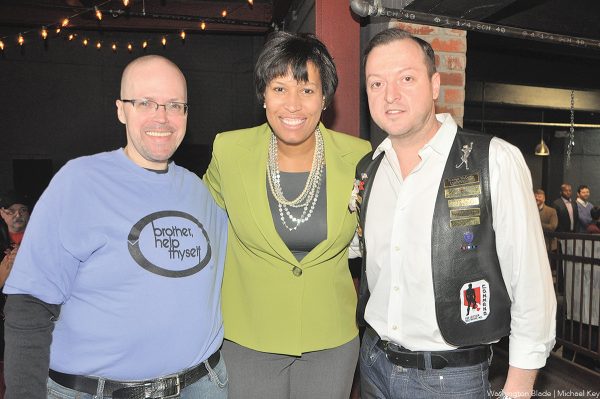
“She has led on HIV/AIDS prevention and treatment, on shelter for vulnerable members of our community, housing for older members of the community, and has been a reliable and constant presence at events to LGBTQIA+ residents,” Slattery said. Among those events, he said, have been World AIDS Day, the D.C. Pride Parade, the 17th Street LGBTQ High Heel Race, and WorldPride 2025, which D.C. hosted with strong support from the mayor’s office.
Ryan Bos, CEO & president of Capital Pride Alliance, the D.C. group that organizes the city’s annual LGBTQ Pride events and served as lead organizer of WorldPride 2025, praised Bowser for being a longtime supporter of that organization.
“She played a very supportive role in helping us as an organization grow and to be able to bring WorldPride to Washington, D.C.,” Bos told the Blade. “And we commend her years of service, And our hope is that she helps us to continue to advocate for the support from the D.C. government of the LGBTQ+ community, especially during these times,” Bos said.
Bos, who was referring to the Trump administration’s hostility toward LGBTQ issues and sharp cutbacks in federal funds for nonprofit organizations, including LGBTQ organizations, said Capital Pride Alliance appreciated Bowser’s efforts to provide city funding for events like WorldPride.
“She provided support through the event process of WorldPride and ultimately along with the D.C. Council provided necessary funding to ensure WorldPride was a success,” Bos said. “And we are proud that we are able to show that Capital Pride and WorldPride had such a large economic impact for D.C. and the D.C. government,” he added.
Marvin Bowser, Mayor Bowser’s gay brother who operates a local photography business and has been active in the D.C. LGBTQ community for many years, said he has also witnessed first-hand his sister’s support for the LGBTQ community and all D.C. residents since the time she became a Council member and even before that.
Among his vivid memories, he said, was his sister’s strong support for the marriage equality law legalizing same-sex marriage in D.C. that the Council approved in 2009 under then-Mayor Adrian Fenty.
“I remember the first time she was standing up and giving clear and unequivocal support to the community when that law passed,” Marvin Bowser told the Blade. “And she was front and center in speaking very strongly in support of marriage equality,” he said.
Marvin Bowser also credits his sister with expanding and strengthening the then-Mayor’s Office of GLBT Affairs, among other things, by appointing advocate Sheila Alexander Reid as the office’s director in 2015.
Reid, who for many years prior to becoming director of the GLBT Affairs office was founder and publisher of the national lesbian publication Women In The Life, had the reputation of a “rock star,” according to Marvin Bowser.
He recalls that Mayor Bowser also played a lead role in D.C.’s bid to host to the quadrennial international LGBTQ sports competition Gay Games for 2022.
D.C lost its bid for the 2022 Gay Games after the Federation of Gay Games selected Hong Kong to host the event in an action that Marvin Bowser says was unfair and based on the effort to hold the Gay Games for the first time in Asia even though D.C. had a stronger bid for carrying out the event.
“Everything she’s done for the community has been very visible and from the heart,” he said of Muriel Bowser. “And in my personal relationship with her, she has also been nothing but absolutely supportive of me and my partner over the years,” he said.
“And we were just at her house helping her put up Christmas decorations,” he added. “And so, it’s been wonderful having her as a sister.”
Veteran D.C. LGBTQ advocate Japer Bowles, who serves as the current director of the Mayor’s Office of LGBTQ Affairs, discussed the mayor’s record on LGBTQ issues in his own statement to the Blade.
“Mayor Muriel Bowser has been an unwavering champion for D.C.’s lesbian, gay, bisexual, transgender, queer, intersex, and asexual community and movement,” he said. “Her more than 20 years of leadership brought consistent and historic investments for our LGBTQIA+ youth, seniors, veterans, and residents experiencing homelessness as well as impactful violence-prevention initiatives,” he added.
“Under her leadership, the Mayor’s Office of LGBTQ Affairs grew into a national leader, delivering more than $10 million in community grants for LGBTQIA+ programs and managing 110 Housing Choice vouchers,” Bowles said in his statement.
“Because of her work, we are stronger, safer, more visible, and, proudly, ‘the gayest city in the world,’” he said in quoting Bowser’s often stated comment at LGBTQ events about D.C. being the world’s gayest city.
In a statement that might surprise some in the LGBTQ community, gay D.C. small business owner Salah Czapary, who served from 2022 to 2024 as director of the Mayor’s Office of Nightlife and Culture as a Bowser appointee, criticized some of the city’s non-LGBTQ related polices under the Bowser administration as being harmful to small businesses.
Bowser appointed Czapary, a former D.C. police officer, to the nightlife office position shortly after he lost his race as an openly gay candidate for the Ward 1 D.C. Council seat held by incumbent Brianne Nadeau.
“Mayor Bowser led D.C. through turbulent years and major growth, and we can all be proud of her leadership on many fronts,” Czapary said in a statement to the Blade. “She is also setting an example that more leaders should follow by stepping aside to allow a new generation to lead,” he said. “But as we turn the page, we must be honest about what the next mayor should deliver,” he says in his statement.
Without mentioning Bowser by name, he went on to list at least four things the next mayor should do that implied that Bowser did not do or did wrong. Among them were treating the D.C. Council as a “true governing partner,” not letting residents and small businesses “feel the weight of outdated, slow, and unresponsive systems,” and the need for leadership that “values competence over loyalty.”
He added that a “reversal” by the city of the city’s streetery program that was put in place during the COVID pandemic to allow restaurants to install outdoor seating into street parking lanes, was a “roll it back” on progress for small businesses.
He concluded by stating, “LGBTQ rights and inclusion are among the many fronts on which we can be very proud of the mayor’s leadership.”
The mayor’s office did not immediately respond to an offer by the Blade to give the office an opportunity to respond to Czapary’s statement.
A significantly different perspective was given by Sheila Alexander Reid, who said she was proud to serve as director of the Mayor’s LGBTQ Affairs Office during the first six-and-a-half years of Bowser’s tenure as mayor.
“I watched her evolve from a newly elected mayor finding her footing into a confident, seasoned leader who met every challenge head-on and time after time slayed the competition,” Alexander Reid said in a statement to the Blade.
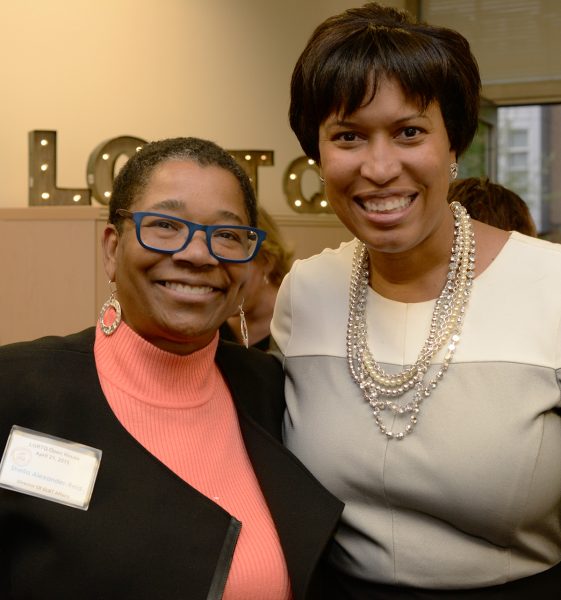
“With each year in office, her voice grew stronger, more grounded, and more fearless,” her statement continues. “And she needed that strength, because being a Black woman mayor is not for the faint of heart, But Mayor Bowser never backed down. Instead, she showed the city what courageous, compassionate leadership truly looks like.”
Alexander Reid added that Bowser funded a new LGBTQ Community Center facility, expanded a workforce development program for the transgender community, and “made D.C. the first jurisdiction in the nation to require LGBTQ+ cultural competency training for healthcare providers.”
She also pointed to the mayor’s LGBTQ “safety nets” through low-barrier shelters and housing vouchers and her support for LGBTQ celebrations like the 17th Street High Heel Race.
“But what inspired me most was this,” Alexander Reid stated. “At a time when some elected officials across the country were retreating from LGBTQ support, Mayor Bowser was doing the opposite. She leaned in, she doubled down. She made sure LGBTQ residents knew they were seen, valued, protected, and loved by their city.”
District of Columbia
HIV/AIDS activists block intersection near White House
World AIDS Day provided backdrop for calls to fully fund PEPFAR
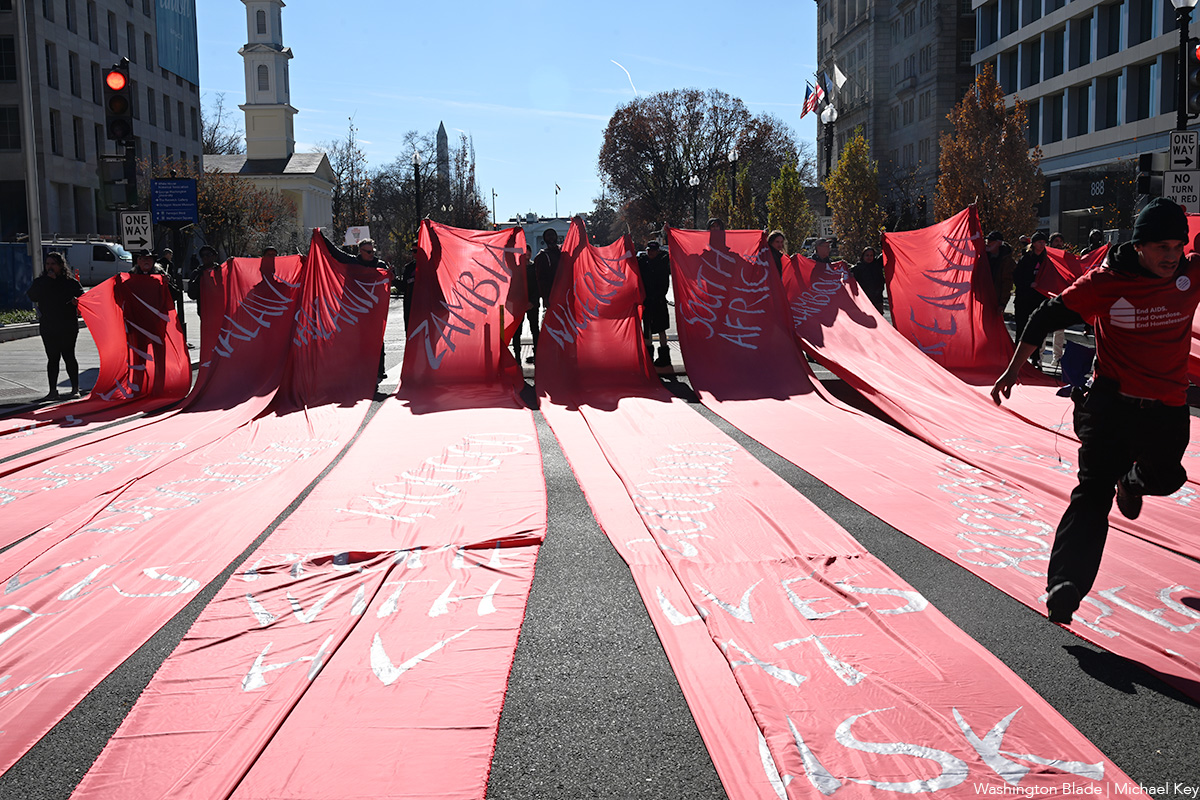
Upwards of 100 HIV/AIDS activists on Monday blocked an intersection near the White House and demanded the Trump-Vance administration fully fund PEPFAR.
Housing Works, Health GAP, Treatment Action Group, AIDS United, ACT UP Philadelphia, and the National Minority AIDS Council organized the protest that took place at the intersection of 16th and I Streets, N.W. The activists then marched to Lafayette Park.
(Washington Blade video by Michael K. Lavers)
(Washington Blade video by Michael K. Lavers)
Activists since the Trump-Vance administration took office in January have demanded full PEPFAR funding.
Secretary of State Marco Rubio Jan. 28 issued a waiver that allowed PEPFAR and other “life-saving humanitarian assistance” programs to continue to operate during the freeze on nearly all U.S. foreign aid spending. HIV/AIDS service providers around the world with whom the Washington Blade has spoken say PEPFAR cuts and the loss of funding from the U.S. Agency for International Development, which officially closed on July 1, has severely impacted their work.
The State Department in September announced PEPFAR will distribute lenacapavir in countries with high prevalence rates. The first doses of the breakthrough HIV prevention drug arrived in Eswatini and Zambia last month.
The New York Times in August reported Office of Management and Budget Director Russell Vought “apportioned” only $2.9 billion of $6 billion that Congress set aside for PEPFAR for fiscal year 2025. (PEPFAR in the coming fiscal year will use funds allocated in fiscal year 2024.)
Bipartisan opposition in the U.S. Senate prompted the Trump-Vance administration in July withdraw a proposal to cut $400 million from PEPFAR’s budget. Vought on Aug. 29 said he would use a “pocket rescission” to cancel $4.9 billion for HIV/AIDS prevention and global health programs and other foreign aid assistance initiatives that Congress had already approved.
“Russell Vought, director of the Office of Management and Budget, has defied the appropriations authority of Congress, slashing the budget for the program despite full funding enacted by lawmakers, stealing $1.6 billion despite the direction of Congress that PEPFAR be fully funded,” notes a press release that detailed Monday’s protest. “As a result, lifesaving treatment and prevention programs have closed across dozens of sub-Saharan African countries, while Vought has refused to release money ringfenced by Congress to save lives.”
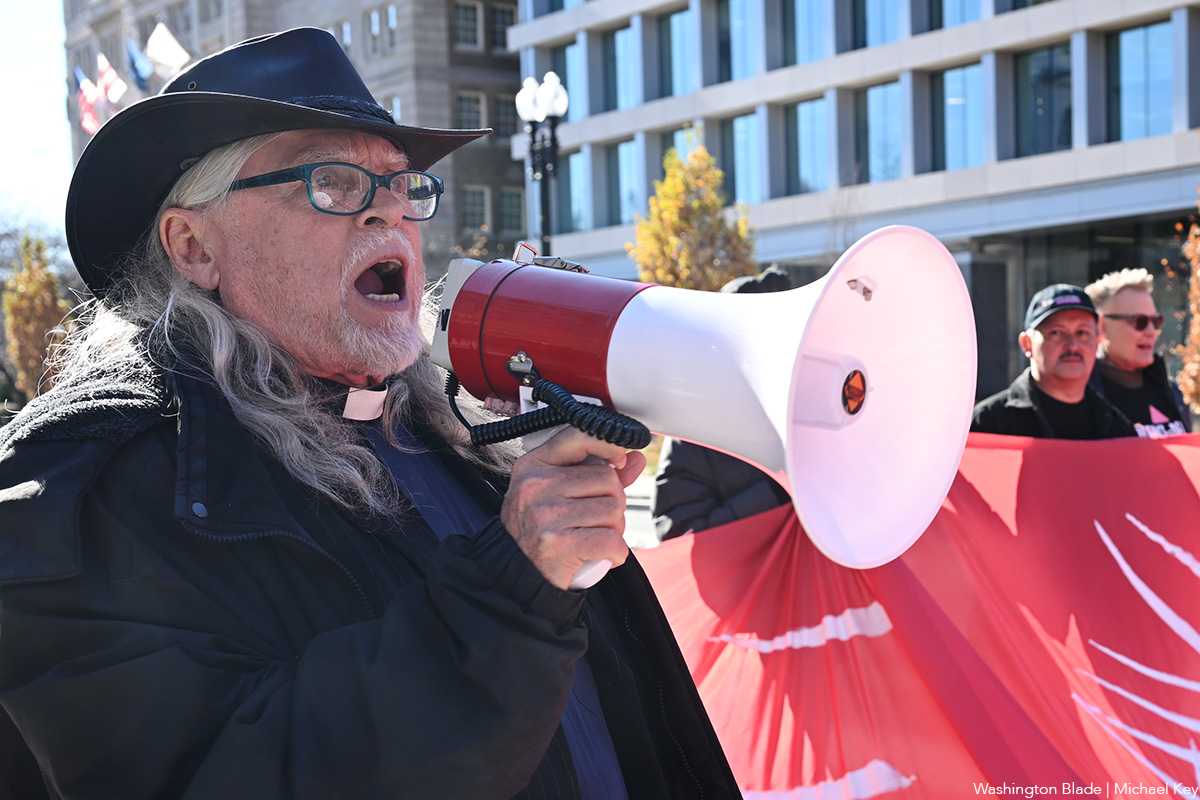
Monday’s protest coincided with World AIDS Day.
The White House has not publicly acknowledged World AIDS Day. A State Department directive the New York Times obtained last week mandated employees and grantees “to refrain from messaging on any commemorative days, including World AIDS Day.”
“Trump thinks by banning commemoration of World AIDS Day, he can hide from the death and destruction that he’s causing around the world,” said Health GAP Executive Director Asia Russell in Lafayette Square. “But we’re here to say, we can see him. We see him stealing medicine, stealing support services, stealing HIV testing, stealing life-saving care from communities all around the world suffering and dying without access.”
The Clinton Health Access Initiative in a report it published last month said more people with HIV or are at risk of contracting the virus because of “HIV treatment and prevention cascades” during the first half of 2025. Specific figures include:
• 3.4 million fewer adults tested for HIV
• 24,000 fewer infants tested for HIV
• A 22 percent decline in new HIV diagnoses due to a reduction in testing among the most vulnerable, highest-risk people
• An 8 percent decline in people living with HIV receiving CD4 tests to diagnose advanced HIV disease
• 2,000 fewer infants and children with HIV started on life-saving medication
• A 37 percent reduction in PrEP initiations for people at risk for HIV
• 26,000 fewer infants and children on antiretroviral medications
• A 5 percent reduction in adults starting antiretroviral medications
• A 10 percent increase in people living with HIV disengaging from treatment
The Clinton Health Access Initiative also said more children around the world will die “due to undiagnosed and un- or under-treated HIV infection” if “these trends persist.”
The Human Rights Campaign Foundation in its 2025 Annual LGBTQ+ Community Survey notes more than 20 percent of adults said “policies the federal government have made accessing HIV prevention and treatment care more difficult in the last year.” The report indicates 30 percent of respondents identify as LGBTQ.
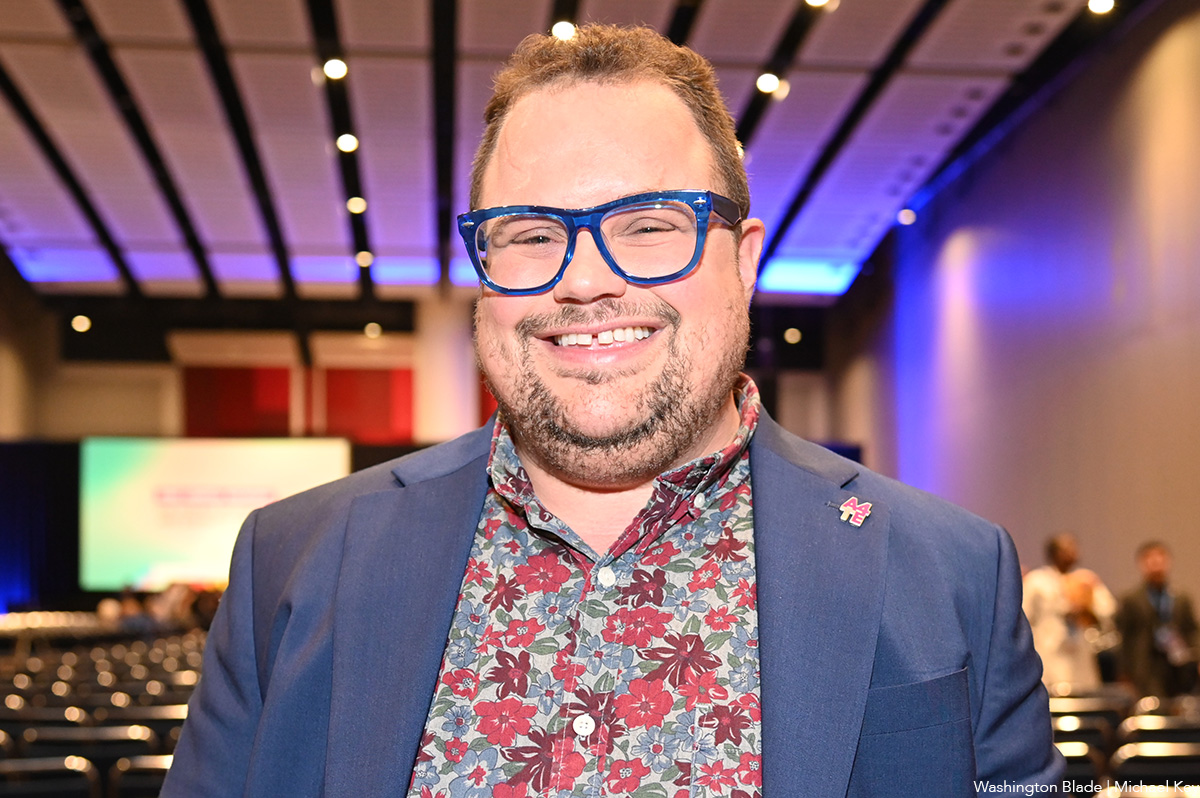
The Comings & Goings column is about sharing the professional successes of our community. We want to recognize those landing new jobs, new clients for their business, joining boards of organizations and other achievements. Please share your successes with us at [email protected].
Congratulations to RODRIGO HENG-LEHTINEN on his new role as Trevor Project Senior Vice President of Public Engagement Campaigns. On accepting the position, he said, “My mission has long been to stop LGBTQ, and especially trans, people from being perceived as political footballs and start getting us seen as real people – your friends, your families, your neighbors. Now I get to focus on that 100% at The Trevor Project.”
Prior to this, he was executive director, Advocates for Trans Equality (A4TE), where he co-led the merger of two national transgender rights organizations, NCTE and TDLEF, to create the new organization. He had served as executive director of the National Center for Transgender Equality, leading that organization through a period of growth, restoring organizational size and stability. He had served as deputy executive director prior to that. Previously he served as vice president of Public Education, Freedom for All Americans, where he led a successful campaign for transgender nondiscrimination protections in New Hampshire. He oversaw a full range of legislative lobbying, field organizing, and communications strategies and oganized a leadership coalition, established structure, and divided roles for key committees of 17 state and national partner organizations and local activists.
Heng-Lehtinen conducted English-language interviews with outlets such as The New York Times, CNN, MSNBC, and Politico. He planned a Transgender Leadership Summit for the Transgender Law Center and served as Development & Donor Services Assistant, Liberty Hill Foundation. He earned his bachelor’s degree in Latin American Studies from Brown University.
-

 The White House1 day ago
The White House1 day ago‘Lavender Scare 2.0’: inside the White House’s campaign against LGBTQ federal employees
-

 District of Columbia3 days ago
District of Columbia3 days agoHIV/AIDS activists block intersection near White House
-

 Movies4 days ago
Movies4 days agoHoliday movie season off to a ‘Wicked’ good start
-

 District of Columbia2 days ago
District of Columbia2 days agoActivists praise Mayor Bowser’s impact on city, LGBTQ community

